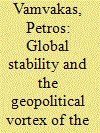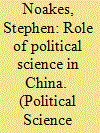| Srl | Item |
| 1 |
ID:
176754


|
|
|
|
|
| Summary/Abstract |
The 2050 target of the European Union to decarbonize the economy by 80–90% will undoubtedly see marine renewable energies playing a key role. The deployment of offshore facilities within the framework of Blue Growth creates tension as competition for other uses of the sea intensifies as economic exploitation of marine resources increases. Marine spatial planning (MSP) is being applied in different Member States, mainly in the North Sea basin, as a way of easing tensions while promoting blue energy. The southernmost marine areas of the continent also have considerable energy potential that, as yet, has not been exploited due to the limitations imposed by a narrow and steep continental shelf, not to mention legal and administrative barriers. MSP processes currently being developed by the application of Directive 2014/89/EU present an opportunity to resolve these conflicts and promote sustainable use of MRE sources in southern Europe. This paper analyzes the marine spatial planning process of five southern European countries - Spain, Greece, Italy, Malta and Portugal - with the aim of determining the degree to which they are incorporating blue energy policies.
|
|
|
|
|
|
|
|
|
|
|
|
|
|
|
|
| 2 |
ID:
137612


|
|
|
|
|
| Summary/Abstract |
The geopolitical game of the twenty-first century will be multilateral and multidimensional, placing great emphasis on political and commercial interests such as resources, markets, ecology, and finance than on military interests. This essay argues that the eastern Mediterranean as an area of geostrategic importance will continue to be vital to global geopolitics and that consigning it to the back burner is shortsighted. The three continents that meet at this crossroads account for almost 90 percent of the global population as well as over 60 percent of global gross domestic product.
|
|
|
|
|
|
|
|
|
|
|
|
|
|
|
|
| 3 |
ID:
134100


|
|
|
|
|
| Publication |
2014.
|
| Summary/Abstract |
A specter is haunting Europe-fear of the impact hundreds of European volunteers to the Syrian jihad might have on their home countries once they return. Perhaps nowhere is the potential danger of this Syrian blowback greater than in the Balkans. According to one estimate, Bosnia has provided more volunteers per capita for the Syrian jihad than any other country in Europe, and various reports suggest there are probably more than five hundred jihadis from southeastern Europe now in Syria.
|
|
|
|
|
|
|
|
|
|
|
|
|
|
|
|
| 4 |
ID:
133221


|
|
|
|
|
| Publication |
2014.
|
| Summary/Abstract |
INTELLECTUALS HAVE HISTORICALLY BEEN AMONG the foremost advocates of political reform in repressive autocratic states. During the early decades of the twentieth century, scholars and writers served as chief witnesses to the atrocities arising from events such as the Spanish Civil War, Nazism, and the Stalinist purges. Later, they formed the basis of the samizdat movement that played an integral part in the destruction of European communism.1 Indeed, the leftist intelligentsia of the former USSR and its satellites became some of those regimes' most ardent critics and the instigators of revolutionary political change.2 More recently, intellectuals have led calls for liberalization in the Color Revolutions of central and southern Europe, as well as sub-Saharan Africa and the Middle East, in some cases even transitioning from academic life into new roles as politicians.3 The late Václav Havel in Czechoslovakia and Kosovo's Ibrahim Rugova are just two of the most ready examples.
|
|
|
|
|
|
|
|
|
|
|
|
|
|
|
|